Language, Culture, and Communication: Dialects and Globalization
VerifiedAdded on 2023/06/05
|6
|1181
|141
Homework Assignment
AI Summary
This assignment delves into key concepts within Language, Culture, and Communication. It begins by exploring speech accommodation theory, analyzing how an individual's dialect can shift based on their environment and social interactions, using the example of an Australian native adapting to British English. The second part examines the debate surrounding endangered languages and globalization, presenting arguments for and against the preservation of minor languages in the face of global linguistic trends. Finally, the assignment analyzes the sociolinguistic phenomenon of code-switching, specifically in the context of German dialects in Switzerland, highlighting how language variations reflect regional identities and social contexts. The solution incorporates relevant terminology and provides a comprehensive understanding of the topics discussed.
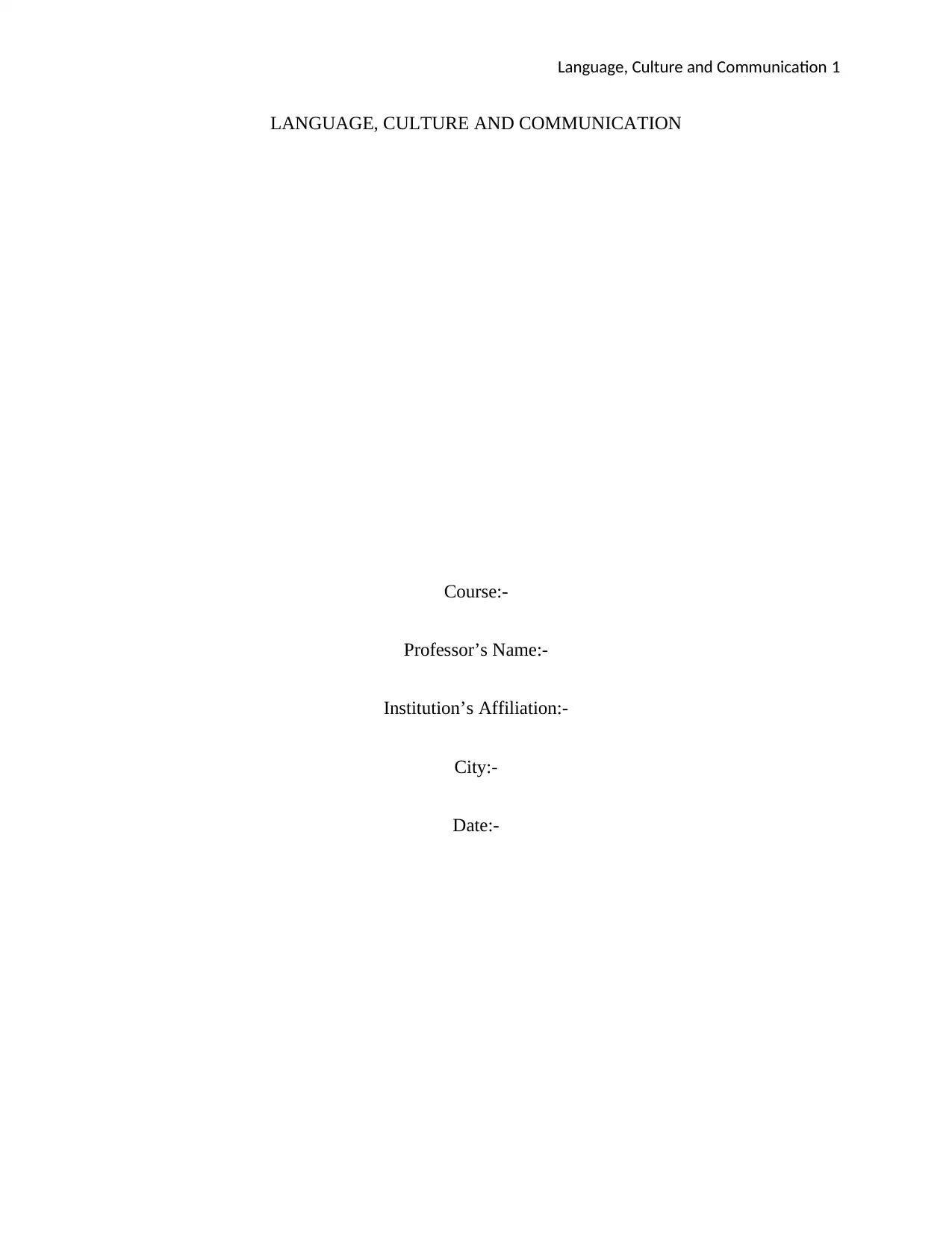
Language, Culture and Communication 1
LANGUAGE, CULTURE AND COMMUNICATION
Course:-
Professor’s Name:-
Institution’s Affiliation:-
City:-
Date:-
LANGUAGE, CULTURE AND COMMUNICATION
Course:-
Professor’s Name:-
Institution’s Affiliation:-
City:-
Date:-
Paraphrase This Document
Need a fresh take? Get an instant paraphrase of this document with our AI Paraphraser
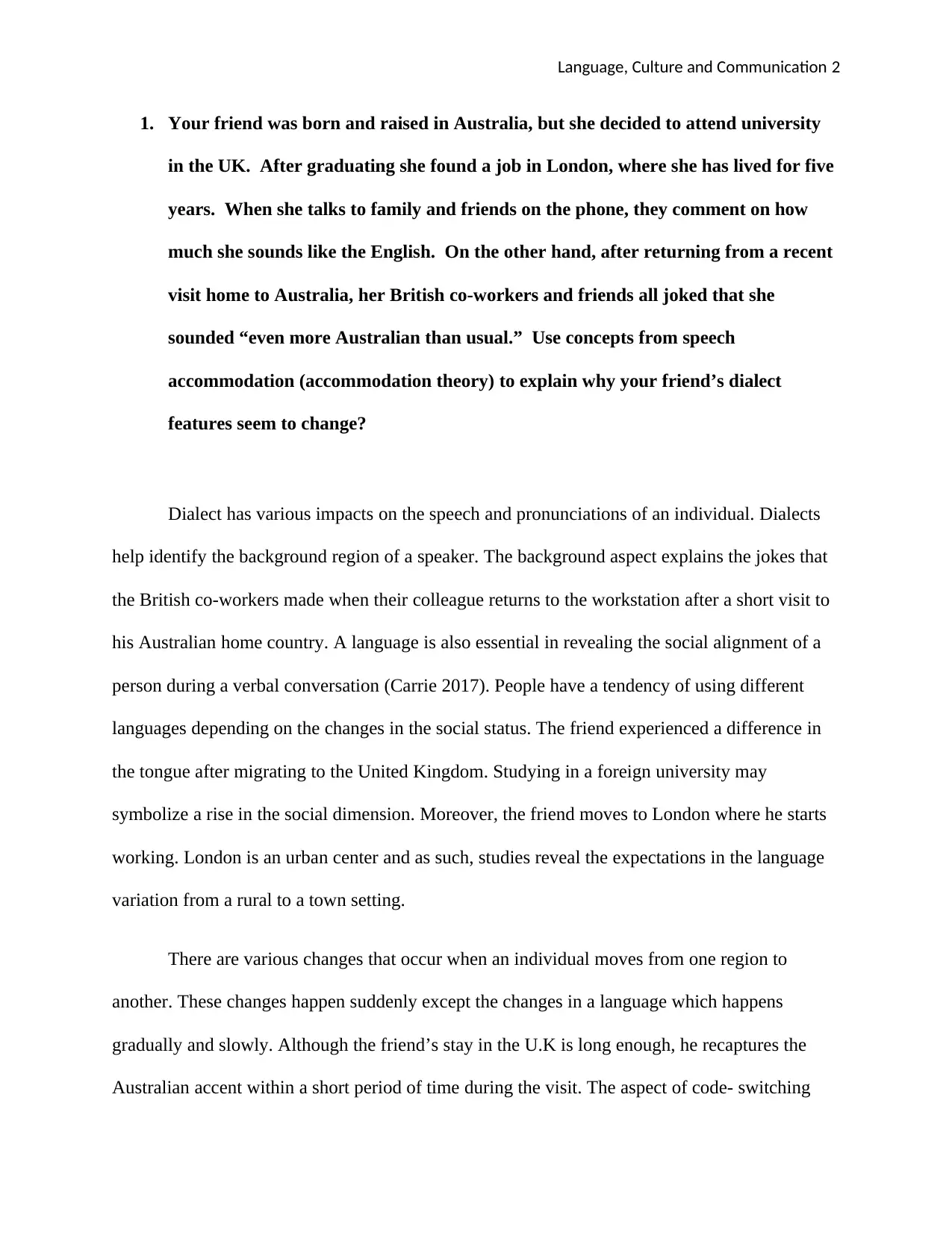
Language, Culture and Communication 2
1. Your friend was born and raised in Australia, but she decided to attend university
in the UK. After graduating she found a job in London, where she has lived for five
years. When she talks to family and friends on the phone, they comment on how
much she sounds like the English. On the other hand, after returning from a recent
visit home to Australia, her British co-workers and friends all joked that she
sounded “even more Australian than usual.” Use concepts from speech
accommodation (accommodation theory) to explain why your friend’s dialect
features seem to change?
Dialect has various impacts on the speech and pronunciations of an individual. Dialects
help identify the background region of a speaker. The background aspect explains the jokes that
the British co-workers made when their colleague returns to the workstation after a short visit to
his Australian home country. A language is also essential in revealing the social alignment of a
person during a verbal conversation (Carrie 2017). People have a tendency of using different
languages depending on the changes in the social status. The friend experienced a difference in
the tongue after migrating to the United Kingdom. Studying in a foreign university may
symbolize a rise in the social dimension. Moreover, the friend moves to London where he starts
working. London is an urban center and as such, studies reveal the expectations in the language
variation from a rural to a town setting.
There are various changes that occur when an individual moves from one region to
another. These changes happen suddenly except the changes in a language which happens
gradually and slowly. Although the friend’s stay in the U.K is long enough, he recaptures the
Australian accent within a short period of time during the visit. The aspect of code- switching
1. Your friend was born and raised in Australia, but she decided to attend university
in the UK. After graduating she found a job in London, where she has lived for five
years. When she talks to family and friends on the phone, they comment on how
much she sounds like the English. On the other hand, after returning from a recent
visit home to Australia, her British co-workers and friends all joked that she
sounded “even more Australian than usual.” Use concepts from speech
accommodation (accommodation theory) to explain why your friend’s dialect
features seem to change?
Dialect has various impacts on the speech and pronunciations of an individual. Dialects
help identify the background region of a speaker. The background aspect explains the jokes that
the British co-workers made when their colleague returns to the workstation after a short visit to
his Australian home country. A language is also essential in revealing the social alignment of a
person during a verbal conversation (Carrie 2017). People have a tendency of using different
languages depending on the changes in the social status. The friend experienced a difference in
the tongue after migrating to the United Kingdom. Studying in a foreign university may
symbolize a rise in the social dimension. Moreover, the friend moves to London where he starts
working. London is an urban center and as such, studies reveal the expectations in the language
variation from a rural to a town setting.
There are various changes that occur when an individual moves from one region to
another. These changes happen suddenly except the changes in a language which happens
gradually and slowly. Although the friend’s stay in the U.K is long enough, he recaptures the
Australian accent within a short period of time during the visit. The aspect of code- switching
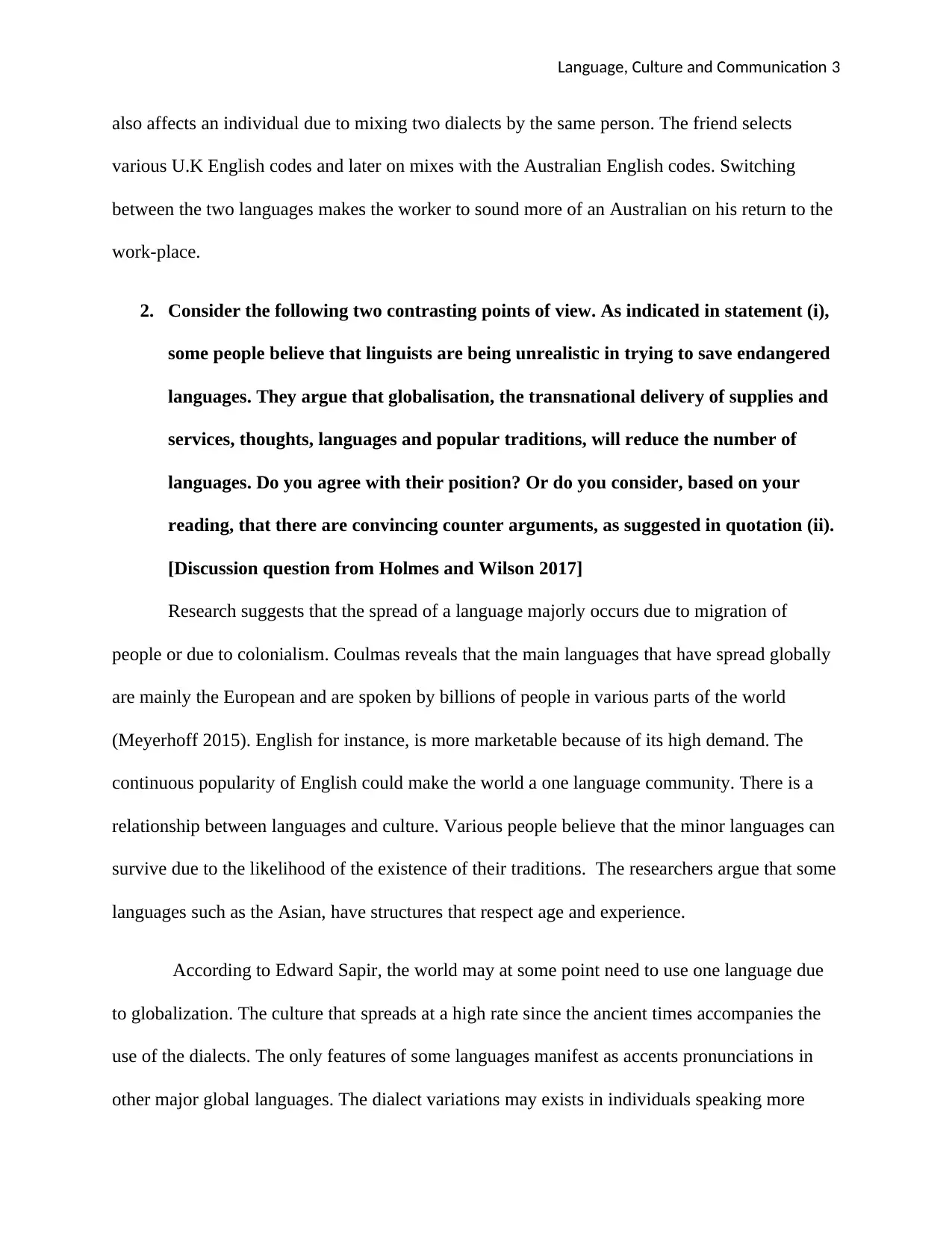
Language, Culture and Communication 3
also affects an individual due to mixing two dialects by the same person. The friend selects
various U.K English codes and later on mixes with the Australian English codes. Switching
between the two languages makes the worker to sound more of an Australian on his return to the
work-place.
2. Consider the following two contrasting points of view. As indicated in statement (i),
some people believe that linguists are being unrealistic in trying to save endangered
languages. They argue that globalisation, the transnational delivery of supplies and
services, thoughts, languages and popular traditions, will reduce the number of
languages. Do you agree with their position? Or do you consider, based on your
reading, that there are convincing counter arguments, as suggested in quotation (ii).
[Discussion question from Holmes and Wilson 2017]
Research suggests that the spread of a language majorly occurs due to migration of
people or due to colonialism. Coulmas reveals that the main languages that have spread globally
are mainly the European and are spoken by billions of people in various parts of the world
(Meyerhoff 2015). English for instance, is more marketable because of its high demand. The
continuous popularity of English could make the world a one language community. There is a
relationship between languages and culture. Various people believe that the minor languages can
survive due to the likelihood of the existence of their traditions. The researchers argue that some
languages such as the Asian, have structures that respect age and experience.
According to Edward Sapir, the world may at some point need to use one language due
to globalization. The culture that spreads at a high rate since the ancient times accompanies the
use of the dialects. The only features of some languages manifest as accents pronunciations in
other major global languages. The dialect variations may exists in individuals speaking more
also affects an individual due to mixing two dialects by the same person. The friend selects
various U.K English codes and later on mixes with the Australian English codes. Switching
between the two languages makes the worker to sound more of an Australian on his return to the
work-place.
2. Consider the following two contrasting points of view. As indicated in statement (i),
some people believe that linguists are being unrealistic in trying to save endangered
languages. They argue that globalisation, the transnational delivery of supplies and
services, thoughts, languages and popular traditions, will reduce the number of
languages. Do you agree with their position? Or do you consider, based on your
reading, that there are convincing counter arguments, as suggested in quotation (ii).
[Discussion question from Holmes and Wilson 2017]
Research suggests that the spread of a language majorly occurs due to migration of
people or due to colonialism. Coulmas reveals that the main languages that have spread globally
are mainly the European and are spoken by billions of people in various parts of the world
(Meyerhoff 2015). English for instance, is more marketable because of its high demand. The
continuous popularity of English could make the world a one language community. There is a
relationship between languages and culture. Various people believe that the minor languages can
survive due to the likelihood of the existence of their traditions. The researchers argue that some
languages such as the Asian, have structures that respect age and experience.
According to Edward Sapir, the world may at some point need to use one language due
to globalization. The culture that spreads at a high rate since the ancient times accompanies the
use of the dialects. The only features of some languages manifest as accents pronunciations in
other major global languages. The dialect variations may exists in individuals speaking more
⊘ This is a preview!⊘
Do you want full access?
Subscribe today to unlock all pages.

Trusted by 1+ million students worldwide
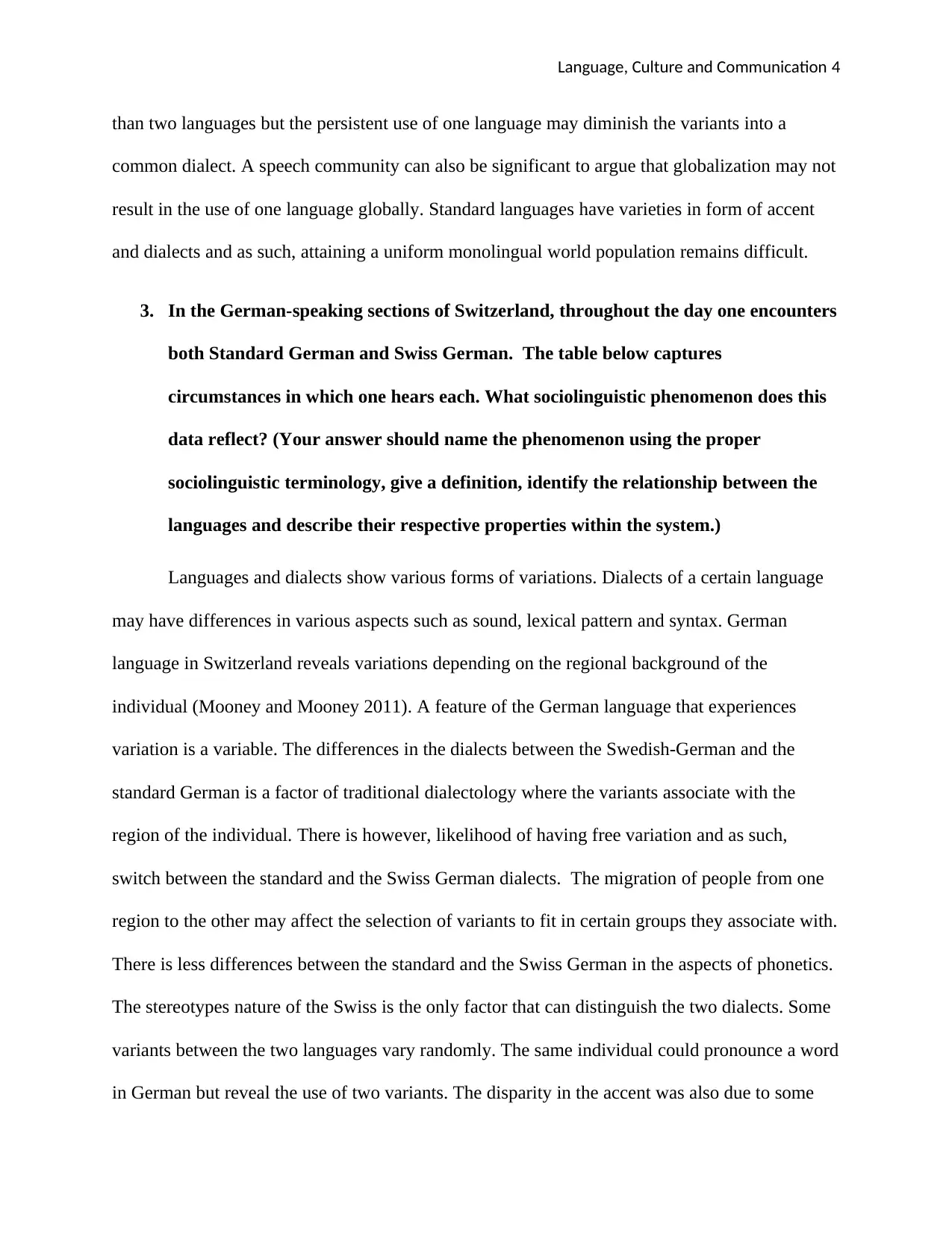
Language, Culture and Communication 4
than two languages but the persistent use of one language may diminish the variants into a
common dialect. A speech community can also be significant to argue that globalization may not
result in the use of one language globally. Standard languages have varieties in form of accent
and dialects and as such, attaining a uniform monolingual world population remains difficult.
3. In the German-speaking sections of Switzerland, throughout the day one encounters
both Standard German and Swiss German. The table below captures
circumstances in which one hears each. What sociolinguistic phenomenon does this
data reflect? (Your answer should name the phenomenon using the proper
sociolinguistic terminology, give a definition, identify the relationship between the
languages and describe their respective properties within the system.)
Languages and dialects show various forms of variations. Dialects of a certain language
may have differences in various aspects such as sound, lexical pattern and syntax. German
language in Switzerland reveals variations depending on the regional background of the
individual (Mooney and Mooney 2011). A feature of the German language that experiences
variation is a variable. The differences in the dialects between the Swedish-German and the
standard German is a factor of traditional dialectology where the variants associate with the
region of the individual. There is however, likelihood of having free variation and as such,
switch between the standard and the Swiss German dialects. The migration of people from one
region to the other may affect the selection of variants to fit in certain groups they associate with.
There is less differences between the standard and the Swiss German in the aspects of phonetics.
The stereotypes nature of the Swiss is the only factor that can distinguish the two dialects. Some
variants between the two languages vary randomly. The same individual could pronounce a word
in German but reveal the use of two variants. The disparity in the accent was also due to some
than two languages but the persistent use of one language may diminish the variants into a
common dialect. A speech community can also be significant to argue that globalization may not
result in the use of one language globally. Standard languages have varieties in form of accent
and dialects and as such, attaining a uniform monolingual world population remains difficult.
3. In the German-speaking sections of Switzerland, throughout the day one encounters
both Standard German and Swiss German. The table below captures
circumstances in which one hears each. What sociolinguistic phenomenon does this
data reflect? (Your answer should name the phenomenon using the proper
sociolinguistic terminology, give a definition, identify the relationship between the
languages and describe their respective properties within the system.)
Languages and dialects show various forms of variations. Dialects of a certain language
may have differences in various aspects such as sound, lexical pattern and syntax. German
language in Switzerland reveals variations depending on the regional background of the
individual (Mooney and Mooney 2011). A feature of the German language that experiences
variation is a variable. The differences in the dialects between the Swedish-German and the
standard German is a factor of traditional dialectology where the variants associate with the
region of the individual. There is however, likelihood of having free variation and as such,
switch between the standard and the Swiss German dialects. The migration of people from one
region to the other may affect the selection of variants to fit in certain groups they associate with.
There is less differences between the standard and the Swiss German in the aspects of phonetics.
The stereotypes nature of the Swiss is the only factor that can distinguish the two dialects. Some
variants between the two languages vary randomly. The same individual could pronounce a word
in German but reveal the use of two variants. The disparity in the accent was also due to some
Paraphrase This Document
Need a fresh take? Get an instant paraphrase of this document with our AI Paraphraser

Language, Culture and Communication 5
residents staying permanently in their rural Swiss homes. The standard accent belonged to a
majority who highly interacted with the German speakers in the urban or international centers.
residents staying permanently in their rural Swiss homes. The standard accent belonged to a
majority who highly interacted with the German speakers in the urban or international centers.
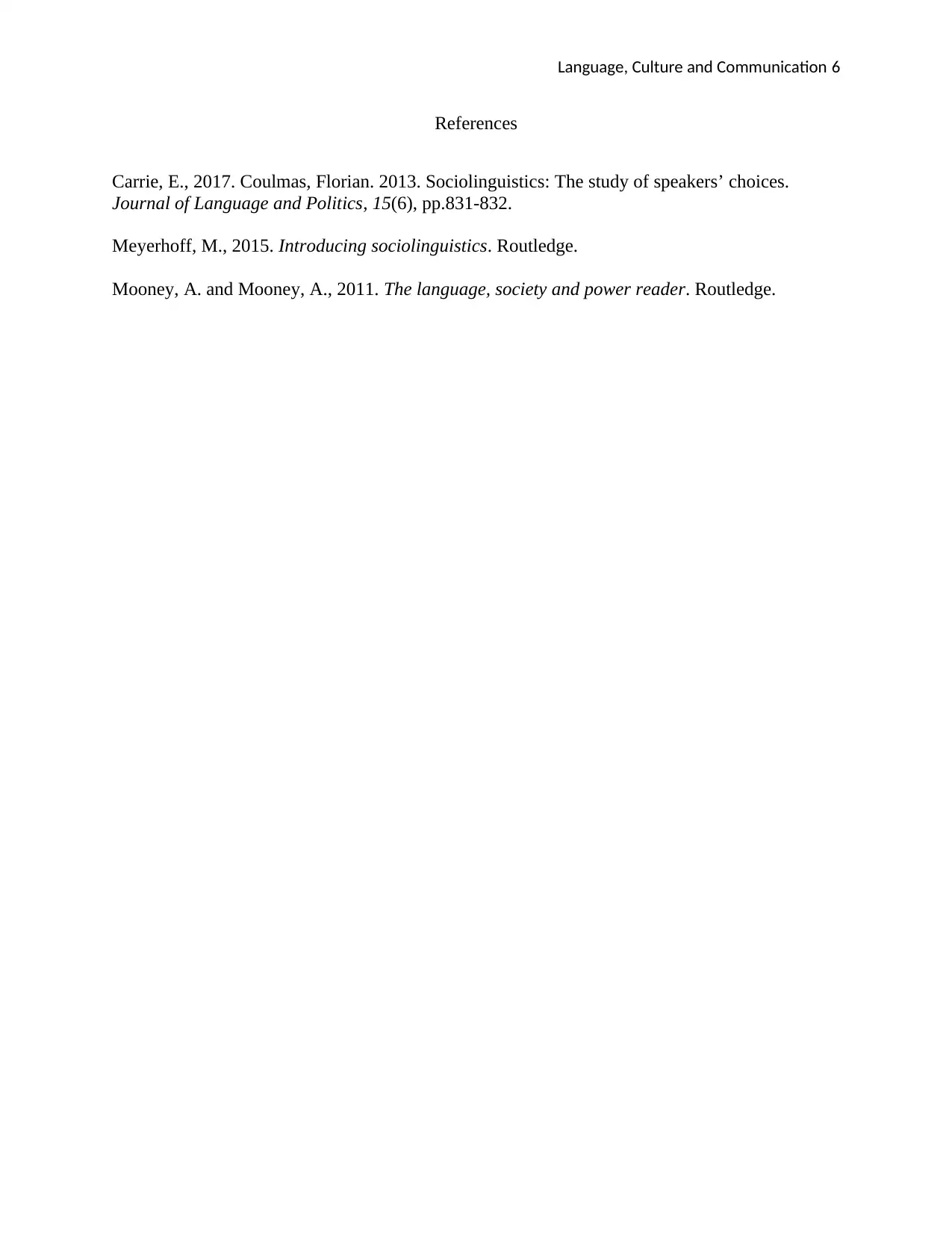
Language, Culture and Communication 6
References
Carrie, E., 2017. Coulmas, Florian. 2013. Sociolinguistics: The study of speakers’ choices.
Journal of Language and Politics, 15(6), pp.831-832.
Meyerhoff, M., 2015. Introducing sociolinguistics. Routledge.
Mooney, A. and Mooney, A., 2011. The language, society and power reader. Routledge.
References
Carrie, E., 2017. Coulmas, Florian. 2013. Sociolinguistics: The study of speakers’ choices.
Journal of Language and Politics, 15(6), pp.831-832.
Meyerhoff, M., 2015. Introducing sociolinguistics. Routledge.
Mooney, A. and Mooney, A., 2011. The language, society and power reader. Routledge.
⊘ This is a preview!⊘
Do you want full access?
Subscribe today to unlock all pages.

Trusted by 1+ million students worldwide
1 out of 6
Your All-in-One AI-Powered Toolkit for Academic Success.
+13062052269
info@desklib.com
Available 24*7 on WhatsApp / Email
![[object Object]](/_next/static/media/star-bottom.7253800d.svg)
Unlock your academic potential
Copyright © 2020–2025 A2Z Services. All Rights Reserved. Developed and managed by ZUCOL.